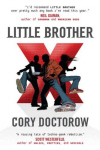Little Brother
Cory Doctorow’s Little Brother is his first young adult book, but don’t let that put you off reading it. This is perhaps the first essential book I’ve read this year, the first novel that feels important enough to recommend it to every single person I discuss books with. While it will resonate best with teens, who will identify closely with its protagonist and his friends, the issues covered over the course of the story are important enough to matter to every American reader.
Cory Doctorow’s Little Brother is his first young adult book, but don’t let that put you off reading it. This is perhaps the first essential book I’ve read this year, the first novel that feels important enough to recommend it to every single person I discuss books with. While it will resonate best with teens, who will identify closely with its protagonist and his friends, the issues covered over the course of the story are important enough to matter to every American reader.
Little Brother is narrated by Marcus Yallow, a seventeen-year-old student and amateur hacker who goes by the internet handle “win5t0n.” He and his friends find themselves apprehended by the Department of Homeland Security following a terrorist attack on San Francisco. Guilty of nothing more than being in the wrong place at the wrong time, Marcus is eventually released and returned home. He’s shaken by what has happened, but also committed to defeating the Department of Homeland Security and the privacy-hating police state that’s replaced the San Francisco Marcus loves.
Without giving away any more plot points, it is worth noting that Little Brother is always engaging – moving quickly from chapter to chapter while also explaining the complexities of modern surveillance, terrorist “prevention,” and, in one of the novel’s most chilling chapters, torture techniques such as waterboarding used by the American government against its so-called “enemy combatants.” Doctorow manages to make discussions of internet security, RFID tags, and cryptography not only interesting and understandable but also organic parts of the book’s plot. Even better, he makes them part of Marcus’s life and the lives of his friends and family. As Marcus defeats one surveillance method after another, he learns that with each victory come consequences that affect not only himself but also everyone around him, giving Marcus’s struggle an urgency that propels the reader forward.
Marcus narrates the story with the wisdom of a hyper-intelligent teenager, explaining his theories and concerns in a friendly, articulate voice, as in this section taken from the chapter where his privacy is first invaded by the DHS:
There’s something really liberating about having some corner of your life that’s yours, that no one gets to see except you. It’s a little like nudity or taking a dump. Everyone gets naked every once in a while. Everyone has to squat on the toilet. There’s nothing shameful, deviant or weird about either of them. But what if I decreed that from now on, every time you went to evacuate some solid waste, you’d have to do it in a glass room perched in the middle of Times Square, and you’d be buck naked?
Even if you’ve got nothing wrong or weird with your body – and how many of us can say that? – you’d have to be pretty strange to like that idea. Most of us would run screaming. Most of us would hold it in until we exploded.
It’s not about doing something shameful. It’s about doing something private. It’s about your life belonging to you.
Marcus provides similar arguments against teachers, DHS officers, and his father, all of whom ask variations of the same question: “Would you rather have privacy or terrorists?” Arguments like these have become a familiar part of our cultural conversation, along with the idea that “if you don’t have anything to hide, then you have nothing to worry about” when it comes to invasive searches or government data-mining programs. Doctorow manages to show that the argument is false, for a number of reasons, not the least of which is that these programs just don’t work very well at catching terrorists, no matter how many guarantees their proponents make.
The arguments and information in Little Brother are what make the book important, but it’s the story that will keep you turning the pages. Despite the occasional plot hole or unrealistic rendering, probably caused by the young adult target audience (like the DHS officers and police who never fire a bullet or seriously hurt any of the teenagers during several riot scenes), the overall story is quite believable. Written like a teenager’s version of 1984, Doctorow’s Little Brother is a smart tale for all ages, and his version of teenage life comes across as a realistic blend of insecurity, idealism, hormones and experimentation. These are real people putting themselves in harm’s way for the greater good, and it is impossible not to be drawn into their lives.
As entertaining as it is informative, readers will find themselves cheering enthusiastically for Marcus and his friends while subconsciously soaking up how-to lessons on detecting secret cameras, defeating gait sensors and thwarting internet surveillance programs. If you only have time to read one more book before the revolution comes, Little Brother should probably be the one you pick.





